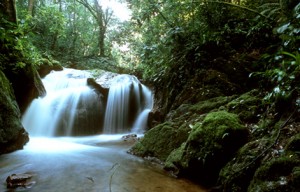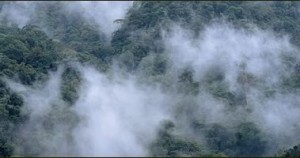Rainforests have been described as “the lungs of the earth”. Rainforests cleanse the atmosphere by absorbing carbon dioxide and churning it out as oxygen. In addition to this, they act like giant sponges; soaking up moisture and then releasing it slowly back into the atmosphere as rain. Tropical forests also moderate the flow of rivers, preventing flooding and insuring adequate flow during periods of low rainfall.
Tropical forests account for only 12% of the land-area on Earth, yet it is home to approximately half of the world’s animal species and two thirds of its plant species. They offer us a bounty of foods such as; coffee, cocoa, bananas, nuts and spices. As well as numerous industrial products like rubber, gums, resins, dyes and tannin.
For many years it was believed that rainforests were seemingly unaffected by global warming. Recent studies now show that tropical forests are being affected presently by climate change. The extinction rate for the rainforest’s species is now 400 times faster than at any other time in history. The impacts that climate change could have on rainforests are much worse than what scientists had previously thought. Scientists now believe that the Amazon (which stores over half of the world’s rain water alone) could shrink by 85% due to climate change. Even in the best case scenario, a moderate rise in temperature could still see a 20-40% loss within 100 years.
In the Montverde Cloud Forest Reserve, Costa Rica clouds are forming higher, drying out some of the habitat and causing changes in the flora and fauna. The troubling disappearance of the golden toad, the distinctive orange amphibian has not been seen since 1991 and is now feared extinct; along with 60 other amphibians and lizards. Scientists believe that the lifting level of the clouds has changed the temperature and moisture of the rainforest. In turn, this has created optimal growing conditions for diseases that are wiping out species at astonishing rates.
According to Peter Cox, professor of climate system dynamics at the University of Exeter in the UK; the loss of the rainforest (the drivers of the world’s weather systems) would be ecologically devastating to our own climate. We can’t predict exactly what would happen but we could assume to experience much more extreme weather. Without rainforests continually recycling mass amounts of water, feeding the rivers, lakes and irrigation systems; droughts would become more common potentially leading to widespread famine and disease.
The loss of tropical forests could potentially hold devastating
consequences for the Earth and those whom inhabit it. Not only would we loose natural resources like fruits, nuts and cocoa; we could witness a devastating loss of approximately half of the world’s species. We would also see the loss of the great carbon sinks, tropical forests act as. Thus, we would also loose our “weather regulator” and really be in for some tough weather patterns. For me, this raises a great deal of concern, as the majority of scholarly sources on the subject point (to some degree) in the direction of irreversibility.




Melissa,
Great use of pictures in your blog post.
Please include a link/citation to the studies you mention in: “Recent studies now show that tropical forests are being affected presently by climate change.”
As well links to where your percentage data comes from (if it is different).
You post has good flow but seems to end abruptly. I would encourage you to provide some of your own insights and thoughts.
Love the pictures as well. I agree that you should include your opinion. Great post.